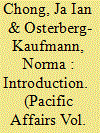| Srl | Item |
| 1 |
ID:
187727


|
|
|
|
|
| Summary/Abstract |
A growing global trend towards authoritarianism has left democracy, especially its liberal form, under strain. This has occurred despite earlier promises of democratization between the end of the Cold War and the early twenty-first century. Our essay examines how the dynamics of post-democratization politics have played out across several polities in Southeast and Northeast Asia. These regions once included supposed “third wave” democracies and polities apparently on the cusp of political liberalization. Such expectations have not panned out. Instead, the region has generally witnessed either significant authoritarian resilience or autocratic resurgence following spurts of political openness. We examine how such autocratic dynamics have played out following earlier movements toward democratization. Specifically, we identify three key elements of post-democratization politics associated with autocratic success and democratic robustness based on contributions to this special issue, and suggest pathways through which they can affect political outcomes.
|
|
|
|
|
|
|
|
|
|
|
|
|
|
|
|
| 2 |
ID:
187732


|
|
|
|
|
| Summary/Abstract |
Democracy is subject to constant and seemingly interminable contestation in academic and policy contexts, and yet, empirically and methodologically robust analysis of what the term means in practice for actual citizens has remained an area of relative lacuna. Admittedly, large-N surveys have attempted to address this research gap by examining attitudes to numerous components of democracy, but without the fine-grained detail required to overcome simply reproducing the focus on liberal procedural, Western precedent-based, top-down approaches to understanding such a complex and varied political system. This article proposes a methodological approach, based on the requirements of comparative political theory and research into how people view democracy. This allows us to explore political attitudes and the meaning of democracy with a bottom-up approach using the methods of repertory grid and in-depth interviews. Singapore is a particularly exciting case for comparative political science: although it has all the advantageous conditions that, according to classic modernization theory, promote the development of democracy, it is still not a democracy.
|
|
|
|
|
|
|
|
|
|
|
|
|
|
|
|